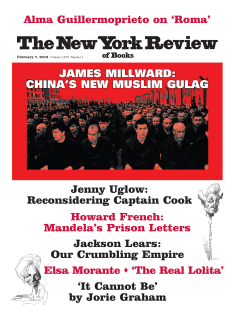In response to:
The Reich in Medias Res from the December 6, 2018 issue
To the Editors:
Recently, Professor Robert Paxton did me the honor of writing a wide-ranging review of The Order of the Day [NYR, December 6, 2018], ending with a brutal conclusion. Understandably, the publication of my book in a great number of countries was unlikely to unfold without some amount of controversy and sniping. Robert Paxton, however, isn’t just any ordinary literary critic. He’s a professor of considerable renown, and the general approach of his article demands a response.
In his review, Professor Paxton scolded me first and foremost for being “opinionated,” and it’s around this admonition that his article subtly pivots. That reproach supposes the existence of a distant, neutral way of writing. With a view to a brief examination of this neutrality that supposedly draws a distinction between history and literature, I followed a lead. Robert Paxton gave a lengthy filmed interview to the INA, France’s National Audiovisual Institute. It’s an archive worth consulting.
One section quickly caught my eye. In it, Professor Paxton speaks about his maître, Raoul Girardet, and the interviewer reminds him that Girardet was a disciple of Charles Maurras, one of the leading far-right intellectuals of the years between the two world wars, as well as an activist and supporter of keeping Algeria French, jailed for his support of the Generals’ putsch. Whereupon Paxton made this strange declaration: “Raoul Girardet struck me as a man capable of being a very fair-minded historian, with an understanding of the archives and very sure-footed judgments, while keeping his own personal ideas to himself.”
As a way of illustrating just what Robert Paxton considers to be a very fair-minded historian, let us quote something that Girardet wrote in a book that Paxton mentions as having played a major role in his own intellectual development. Girardet, summoning up the soldier of what he calls the colonial saga, writes: “a true lord of war with an almost feudal appearance, in the old tradition of the Army of Africa which continues the exploits of the adventurer of the Moroccan campaigns.” Now, we’re talking about the Rif War, the first use of poison gases on the civilian populace, resulting in tens of thousands of deaths. Among these true lords of war, we find the future General Franco, José Millán-Astray, and Marshal Pétain. I can’t say whether the phrase true lord of war is a good reflection of Girardet’s understanding of archives or his sure-footed judgments. But I do think that one may at least safely describe these views as vaguely “opinionated.”
Basically, it’s a very common attitude in academia to consider as inappropriate all intrusions into one’s domain of expertise. That said, it’s not entirely pervasive. As great a historian as Georges Duby, for instance, thought otherwise; he certainly believed that literature could teach him something, and not merely as a human being, but also as a historian. That’s the crucial point, and the reason that I wished to reply to Professor Paxton.
The position that he adopts so casually toward literature, the idea that it ought to behave itself and keep to the art of the novel, is not merely retrograde—it also entails a concept of knowledge. Because if Professor Paxton can drape himself as he pleases in the robes of history and improvise his literary expertise, that would seem to imply that history is serious business, where only one method applies, with its variants, while literature would be little more than an offhand pursuit. Aside from smacking of a naive territoriality, this attitude betrays above all a denial of all that is entailed by writing, language, and composition, the sort of thing that he dismisses contemptuously as “piling on disparate details,” or else more amiably as a prose that is “muscular, concrete, richly inventive.” In his estimation, knowledge cannot be built in anything other than “an analytical way.” From this point of view, Professor Paxton imagines that writing is nothing more than a matter of ornamentation, and composition, a simple question of balance. He is certainly free to apply these dreary categories to his own books.
Éric Vuillard
Rennes, Brittany, France
(translated from the French by Antony Shugaar)
Robert O. Paxton replies:
Éric Vuillard might be surprised to learn that I required students in my university courses on twentieth-century Europe and on France since 1848 to read a classic novel of the period, and to write an essay relating it to the course. Good fiction needs no utilitarian justification, but it can contribute powerfully to history teaching. Some novels do this better than others.


